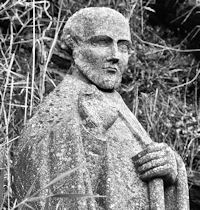
Daily Readings for:January 29, 2014
(Readings on USCCB website)
Collect: Almighty ever-living God, direct our actions according to your good pleasure, that in the name of your beloved Son we may abound in good works. Through our Lord Jesus Christ, your Son, who lives and reigns with you in the unity of the Holy Spirit, one God, for ever and ever.
RECIPES
ACTIVITIES
PRAYERS
o Prayer Before Confession - 2
» Enjoy our Liturgical Seasons series of e-books!
Old Calendar: St. Francis De Sales, bishop, confessor and doctor; St. Gildas the Wise, abbot (Hist)
According to the 1962 Missal of Bl. John XXIII the Extraordinary Form of the Roman Rite, today is the feast of St. Francis de Sales. In the Ordinary Rite his feast is celebrated on January 24.
Historically today is the feast of St. Gildas the Wise, Scottish bishop and author and sometimes listed as Badonicus. He was born in the Clyde River area of Scotland. After becoming a disciple of St. Finnian, Gildas was a hermit for a time in Wales. He was also trained by St. Illtyd. He was famous for writing De Excidiio Britanniae, a Latin work describing moral decline in Britain.
St. Gildas the Wise
He was probably born about 517, in the North of England or Wales. His father's name was Cau (or Nau) and that he came from noble lineage.
He lived in a time when the glory of Rome was faded from Britain. The permanent legions had been withdrawn by Maximus, who used them to sack Rome itself and make himself Emperor.
Gildas noted for his piety was well educated, and was not afraid of publicly rebuking contemporary monarchs, at a time when libel was answered by a sword, rather than a Court order.
He lived for many years as an ascetic hermit on Flatholm Island in the Bristol Channel. Here he established his reputation for that peculiar Celtic sort of holiness that consists of extreme self-denial and isolation. At around this time, according to the Welsh, he also preached to Nemata, the mother of St David, while she was pregnant with the Saint.
In about 547 he wrote De Excidio Britanniae (The Ruin of Britain). In this he writes a brief tale of the island from pre-Roman times and criticizes the rulers of the island for their lax morals and blames their sins (and those that follow them) for the destruction of civilization in Britain. The book was avowedly written as a moral tale.
He also wrote a longer work, the Epistle. This is a series of sermons on the moral laxity of rulers and of the clergy. In these Gildas shows that he has a wide reading of the Bible and of some other classical works.
Gildas was an influential preacher, visiting Ireland and doing missionary work. He was responsible for the conversion of much of the island and may be the one who introduced anchorite customs to the monks of that land.
He retired from Llancarfan to Rhuys, in Brittany, where he founded a monastery. Of his work on the running of a monastery (one of the earliest known in the Christian Church), only the so-called Penitential, a guide for Abbots in setting punishment, survives.
He died around 571, at Rhuys. The monastery that he had founded became the center of his cult.
St. Gildas is regarded as being one of the most influential figures of the early English Church. The influence of his writing was felt until well into the Middle Ages, particularly in the Celtic Church.
Things to Do:
- Read St. Gildas's work The Ruin of Britain here.